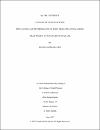Prevalence and determinants of body dissatisfaction among Arab women at post-partum in Qatar
Abstract
Background: The image of the body is defined as the image of a person, his thoughts and feelings towards his body. Body Dissatisfaction is a problem of increasing and influential interest in women's lives after childbirth.
Objectives: The aim of this study was to assess the prevalence of body dissatisfaction among Arab women at post-partum in Qatar, identifying the underlying factors and exploring the relationship between them.
Methodology: This is a cross-sectional survey conducted from November 2016 to April 2017. The study included 400 participants in different regions in Qatar; these regions were northern, central and western. Data were collected from 12 health centers by using a self-administered questionnaire to identify potential contributors to body dissatisfaction among post-partum participants, and weight and height were taken by a certified nurse and recorded directly in the questionnaire.
Statistical Analysis Methods: Correlation coefficients were estimated to investigate possible associations between continuous variables. ANOVA used to assess differences between mean outcomes of two or more independent groups. Also, comparisons of frequencies among BMI groups were performed by Chi-square test. Finally, a multivariate binary logistic regression model was estimated to investigate the important predictors of the body dissatisfaction and their significance was re-examined with univariate analyses.
Results: A total of 62 % of the women surveyed were dissatisfied with body image. Of these, the majority are overweight and obese. There was a significant correlational relationship between body dissatisfaction and Body Mass Index (BMI), general appearance, perception of body shape and unhealthy dieting method. Findings showed that despite having a normal body weight and appropriate body shape, post-partum women desire to have a much lighter and slimmer body, potentially in response to the strongly portrayed socio-cultural thin ideal body. Finally, the use of unhealthy dieting techniques to control weight was higher among overweight and obese women who are dissatisfied with their body.
Conclusion: Body dissatisfaction was widespread among Arab women at six months post-partum in Qatar. This study was the first of its kind as there had been no previous studies carried out to determine presence of body dissatisfaction among Arab women living in Qatar.
DOI/handle
http://hdl.handle.net/10576/5779Collections
- Public Health [54 items ]


